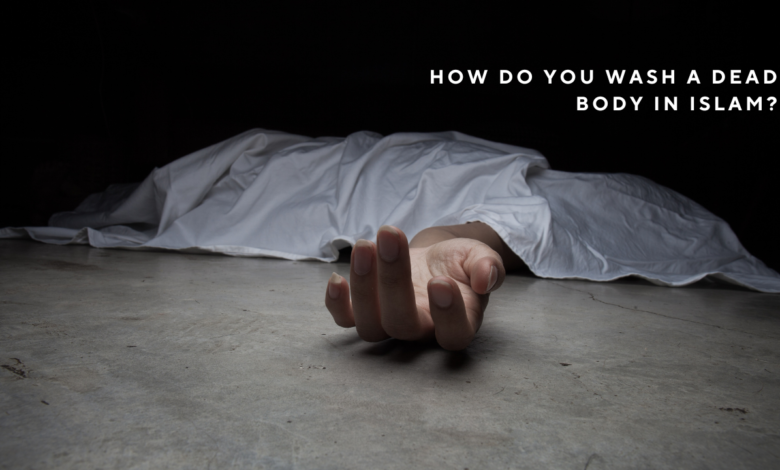How do You Wash a Dead Body in Islam?
Honoring the Departed: The Islamic Ritual of Ghusl

How do You Wash a Dead Body in Islam?
Ghusl is the Islamic ritual of washing a deceased body. It is a crucial step in preparing a deceased person for burial.

Introduction
In Islam, the proper care and burial of a deceased individual is of paramount importance. The process of washing a dead body, known as Ghusl, is a sacred and highly regarded ritual in Islamic tradition. It is performed with great reverence and care, ensuring that the deceased is prepared for their journey into the afterlife. In this article, we will explore the important aspects and steps involved in the Islamic practice of washing a deceased body.
The Significance of Ghusl
Ghusl is a fundamental religious obligation in Islam and is an essential part of the funeral rites. The ritual serves both spiritual and hygienic purposes, symbolizing purification and respect for the deceased. The Ghusl is carried out with the utmost care and respect, as it is believed that the soul of the deceased remains present during this process.
Also check.
- Why is the Cow Sacred in Hinduism?
- What is Samsara in Hinduism?
- What is Quran?
- What is Haram?
- Where did Islam Originate?
- Which types of Clothes are Haram on Men?
Preparation for Ghusl
Before performing Ghusl, several preparations must be made. It is crucial to maintain a solemn and respectful atmosphere during the entire process. The following are key aspects of preparation:
- Designated Place: Ghusl should be performed in a clean, secluded, and dignified area, typically in a room specifically designated for this purpose.
- Clean Water: Pure, clean, and warm water should be readily available. The water used should not be extremely hot to avoid causing harm to the body.
- Attendants: A group of individuals should be chosen to perform the Ghusl. These individuals are usually close family members or individuals well-versed in the ritual. They must be mature, trustworthy, and maintain proper Islamic etiquette during the process.
Steps of Ghusl
The actual process of Ghusl involves specific steps, each of which is carried out with great care:
- Removal of Soiled Clothing: The deceased’s soiled clothing is gently removed, ensuring the body remains covered with a clean sheet. Modesty and privacy are of utmost importance throughout the process.
- Preliminary Washing: The body is gently washed with lukewarm water to remove any impurities. It is essential to be extremely gentle to avoid causing any harm to the body.
- Gentle Cleansing: The body is carefully cleansed starting from the right side, with special attention given to the areas of impurity. The process is repeated on the left side, ensuring thorough purification.
- Washing the Hair and Beard: The hair and beard, if applicable, are gently washed, ensuring every strand is thoroughly cleaned.
- Final Rinse: The entire body is rinsed with clean water, ensuring that no impurities remain. It is essential to maintain a reverent and gentle demeanor during this step.
- Drying the Body: The body is gently patted dry with a clean, soft cloth.
- Perfuming the Body: After the Ghusl, the body is anointed with a natural fragrance, such as camphor or perfume, to ensure a pleasant scent.
- Shrouding: Following the Ghusl, the body is wrapped in a simple, white shroud (kafan), which is typically made of three pieces of white cloth. The shroud symbolizes the equality of all individuals in death.
- Salat al-Mayyit: A special prayer called Salat al-Mayyit is performed for the deceased, asking for God’s mercy and forgiveness.
Conclusion
The process of Ghusl, or washing a deceased body in Islam, is a deeply significant ritual that reflects the respect and reverence Muslims have for the departed. It is an act of purification and a symbol of the transition to the afterlife. Those who participate in this ritual do so with great care and a profound sense of responsibility. By adhering to these guidelines and traditions, the Islamic community honors the deceased and fulfills an essential religious duty, ensuring a dignified and peaceful transition to the hereafter.

FAQs
What is Ghusl in Islam?
Ghusl is the Islamic ritual of washing a deceased body. It is a crucial step in preparing a deceased person for burial.
Why is Ghusl performed in Islam?
Ghusl is performed to purify the deceased and ensure their readiness for the afterlife. It is both a religious obligation and a sign of respect for the departed.
Who is responsible for performing Ghusl?
Typically, close family members or individuals knowledgeable about the procedure and Islamic etiquette are responsible for performing Ghusl. They must be mature and trustworthy.
Where is Ghusl performed?
Ghusl is usually conducted in a clean, secluded room designated for this purpose to maintain privacy and solemnity.
What are the steps involved in Ghusl?
The steps of Ghusl include removing soiled clothing, preliminary washing, gentle cleansing, washing the hair and beard, a final rinse, patting the body dry, perfuming the body, shrouding in a white kafan (shroud), and performing Salat al-Mayyit, a special prayer for the deceased.
How should the deceased’s body be handled during Ghusl?
The body should be treated with extreme care and gentleness, ensuring that no harm comes to it during the process.
Are there specific guidelines for the water used in Ghusl?
The water should be pure, clean, and lukewarm. It’s crucial to avoid water that is extremely hot to prevent any harm to the body.
What is the significance of using a white shroud (kafan)?
The white shroud symbolizes the equality of all individuals in death, emphasizing the humility of all before God.
Is Ghusl performed for all deceased individuals in Islam?
Ghusl is performed for all deceased Muslims. It is considered a fundamental part of Islamic funeral rites.
Can women perform Ghusl on a female deceased, and men on a male deceased?
It is preferred that Ghusl is performed by individuals of the same gender as the deceased. For a female, female family members or close associates usually conduct the ritual, while males handle the Ghusl for a male deceased.




